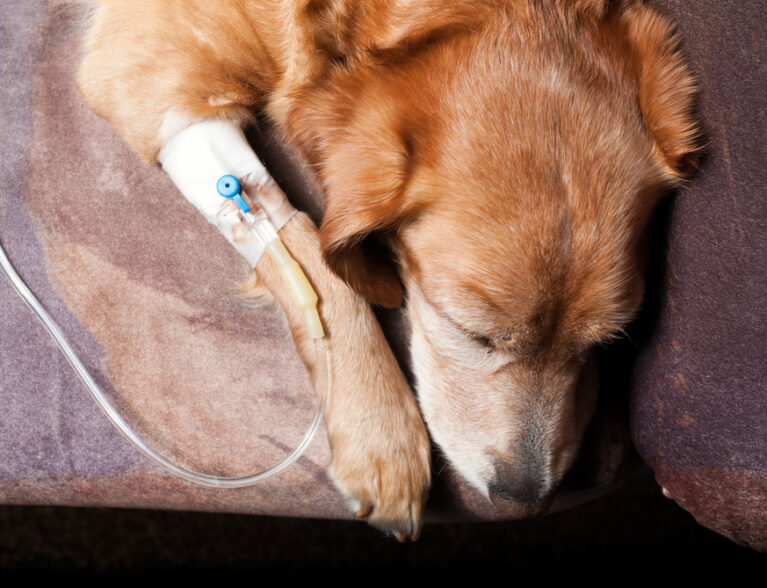
A cancer diagnosis tends to be devastating, whether the diagnosis is for oneself or a family member. And it can be almost as tough when a beloved pet is the one with the disease.
Now, a treatment that has been used to help human cancer patients is available to treat dogs as well.
High-dose vitamin C intravenous infusion is a holistic therapy available to people suffering from chronic syndromes, including autoimmune disease and cancer. Late last month, an island dog with cancer underwent the therapy, which her veterinarian, Dr. Darrell Nazareth, believes is the first to be performed on the Treasure Coast.
A veterinary clinician at Vero Beach Veterinary Hospital, Nazareth practices both conventional western and integrative veterinary medicine, creating a personalized treatment for each patient that can include Vitamin C infusion for dogs suffering from cancer.
A vitamin infusion might seem a little out there as a cancer treatment, but “vitamin C . . . has an important physiologic role in numerous metabolic functions including tissue growth and maintenance, amelioration of oxidative stress, and immune regulation,” according to a group of veterinarians and academics at Ohio State University who published a paper in 2020 that is available in the National Library of Medicine at the National Institutes of Health. The group goes on to state that “the possible benefits, seemingly low risk of adverse effects, and the low cost of this treatment make vitamin C therapy a promising area of future investigation in critically ill dogs and cats.”
In “The Dog Cancer Survival Guide,” veterinarian Demian Dressler writes that “if you are dealing with a life-threatening cancer and your dog does not have calcium oxalate urinary stones, you should consider adding IV vitamin C to your dog’s treatment plan. This is especially true if your dog is not receiving chemo and radiation.”
Writing in Animal Wellness magazine, veterinarian Dr. Rose DeLeva reports that, “Vitamin C happens to be one of the most potent biological antioxidants on the planet. It has been shown to be antiviral, antihypertensive, airway protective, ophthalmo-protective, and has heavy-metal detoxifying properties.”
“If vitamin C is used in addition to conventional therapies,” Nazareth explains, “it has been shown to prevent or decrease the adverse effects related to these treatments, and it can be safely used before or after radiation or chemotherapy and before or after surgery to decrease metastasis and boost immune function.
“Vitamin C infusion therapy is geared for dogs suffering from chronic disease: it can be used in conjunction with conventional cancer therapies – chemo, radiation and surgery – or as a primary treatment if the owner chooses or when a pet cannot tolerate the conventional treatments.”
The intravenous delivery system involves the administration of high doses of vitamin C directly into the bloodstream, reaching levels high enough, says Nazareth, “to reduce inflammation and induce the production of hydrogen peroxide which directly kills cancer cells in the early stages of cancer.”
The vitamin C option, explains Nazareth, can also provide palliative care, especially for geriatric animals, to reduce discomfort and increase their quality of life.
Suffering from mast cell cancer, the 11-year-old patient treated in Vero last month had been lethargic, and her owners, who wish to remain anonymous, chose to try the vitamin C therapy for their pet, hoping it could lessen her discomfort and improve her quality of life.
The procedure took place while she was being boarded at the hospital. Veterinary technician Brandee Deetscreek monitored the 8-hour vitamin C infusion procedure, which lasted from 8 a.m. to 4 p.m.
The strength of the vitamin C is based on the dog’s weight and is administered in a saline solution drip via an IV catheter inserted into a front leg, Deetscreek says. “Dogs undergoing this procedure, including this patient, typically exhibit no discomfort.”
Prior to the procedure, the patient was experiencing extreme weakness, didn’t want to eat, leave the kennel or even move within the kennel.
The infusion was administered in segments, with breaks to let the dog go out to pee and stretch a bit. Deetscreek says that after the first two hours, and during each break thereafter, the patient got up, peed, wanted to play, checked out her food bowl, and continued to exhibit increased energy and more normal behavior, a treatment outcome that indicated improved quality of life and wellbeing.
Whether she will have another treatment will be based on her future needs, the progress of her cancer, the doctor’s assessment and her owners’ decisions.
“Intravenous Vitamin C therapy,” Nazareth says, “is considered an intense detox therapy and falls under holistic or alternative medicine. There is no guarantee of success. Potential side effects include drinking more water, urinating more frequently and diarrhea, which is treated with probiotics.”
Nazareth received his veterinary degree from the University of Liverpool in England. After practicing in Australia, New Zealand and England, he relocated to the US, where he practiced in New England before coming to Vero Beach in 2006.
Certified in veterinary acupuncture, he incorporates holistic care and herbal medicine into his practice and states, “the philosophy I embrace with all my patients: ‘first, do no harm.’



